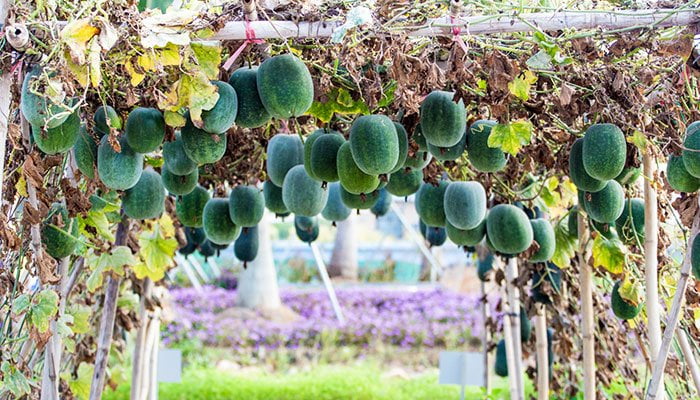What Is Dong Gua Pi
Dong Gua Pi commonly known as Exocarpium Benincasae or Wax Gourd Peel is the peel of Benincasa hispida, which is an annual vine belonging to the family Cucurbitaceae. It is a relatively practical and common Chinese herbal medicine, which first appeared in <Kaibao Bencao> (Materia Medica of the Kaibao Period) around 974 AD.
Benincasa hispida is the only member of the genus Benincasa. It is also called Wax Gourd, Ash Gourd, white gourd, Winter Gourd, Tallow Gourd, Ash Pumpkin, and Winter Melon.
This plant is native to Southeast Asia and is now widely distributed in tropical, subtropical, and temperate regions of Asia. Their fruit is a popular vegetable in East Asia, and their peel and seeds are used for medicinal purposes.

From summer to autumn, people gather the ripe fruits of Benincasa hispida, wash them with water, peel their outer peels, cut them into pieces or silk, dry them in the sun, and make them into Chinese herbal medicines.
Dong Gua Pi contains n-hexanal, n-hexyl formate, p-hydroxybenzoic acid, protocatechuic acid, isovanillin, 5-hydroxymethylfurfural, isovitexin, vitexin, orientin, multiflorenol, astillbin, catechin, vitexin-2″-O-rhamnoside, vitexin-4″-O-glucoside, naringenin, quercetin, gallic acid, caffeic acid, carotene, vitamin B, vitamin C, nicotinic acid, rutin, polysaccharides, pigments, waxes, resins, starch, and some trace elements.
Generally, gray-green and thin Dong Gua Pi with some insect-like pruina on the outer peel is preferred.
According to <Dian Nan Ben Cao>, the medicinal nature of Dong Gua Pi is relatively cool, with a sweet taste. It has a certain therapeutic effect on the pathological changes of the spleen and small intestine meridians.
In traditional Chinese medicine, it is often used to induce diuresis and reduce edema, clear summer heat, and treat edema, thirst, dysuria, scanty dark urine, obesity, hyperlipidemia, hypertension, diabetes, uremia, acute nephritis, nephrotic syndrome, acute hepatitis, cirrhosis, ascites, urticaria, and hemorrhoids.
Benefits
- Anti-oxidation, scavenging superoxide anion free radicals, hydroxyl free radicals, and DPPH free radicals.
- Inhibiting the activity of the angiotensin-converting enzyme, and preventing cardiovascular disease and cancer [1].
- Inhibiting the body weight gain, lowering serum total cholesterol, triglyceride, and low-density lipoprotein cholesterol contents, and improving lipid and glucose metabolic disorders in mice fed with a high-fat diet [2].
- Inducing diuresis, treating edema and dysuria.
- Clearing summer heat, treating thirst and scanty dark urine caused by summer-heat.
- Studies have confirmed that its extract can inhibit the formation of advanced glycation end products and α-glucosidase activity, and prevent and treat type 2 diabetes and its complications [3].
- Its ethyl acetate crude extract has a certain inhibitory effect on the growth of Escherichia coli, Bacillus subtilis, Staphylococcus aureus, Fusarium graminearum, Rhizotonia cerealis, Exserohilum turcicum, and cotton wilt fusarium.
Combinations
- It can be used in combination with Wu Jia Pi (Cortex Acanthopanacis), Sheng Jiang (Rhizoma Zingiberis Recens), etc. to treat edema and dysuria.
- It can be used in combination with Chi Xiao Dou (Adzuki Bean), brown sugar, etc. to treat edema caused by general asthenia.
- It can be combined with Xi Gua Cui Yi (Watermelon Peel), etc. to treat thirst and scanty dark urine caused by summer-heat.
- It can be used in combination with Yi Yi Ren (Semen Coicis), Hua Shi (Talcum), Bai Bian Dou (White Hyacinth Bean), etc. to treat the syndrome of summer-heat-dampness.
- It can be used in combination with Jing Jie (Schizonepeta Tenuifolia) and Jin Yin Hua (Flos Lonicerae), etc. to treat acute urticaria.
Side Effects
- At present, there is no literature report that Dong Gua Pi has toxic effects, and no data is showing that taking it at the prescribed dose can cause serious adverse reactions.
Precautions and Warnings
- The dosage of Dong Gua Pi should be controlled at 9-30g.
- It can be made into decoctions, pills, or lotions.
- People allergic to wax gourd should not take it.
- It should not be used to treat puffiness caused by malnutrition.
- Pregnant and breastfeeding women should take it under the guidance of a doctor.
